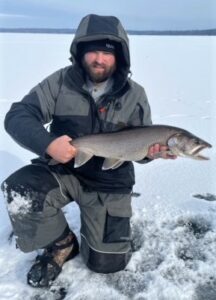The Togue Hunters

By Stu Bristol
These men and women are a rare and hearty breed, for sure. They travel Maine from end to end, in snowstorms, ice and rain, sometimes for hours at a time in a single day. Armed with modern ice fishing gear they search for the Togue (Lake Trout) honey holes looking for those elusive 20 pounders. They are the “Togue Hunters.”
We are not talking about randomly drilling a 10-inch hole in sometimes over two feet of ice. Careful study of Navionics bathymetric maps, satellite imagery and state-of-the-art sonar units are all in play.
Special Touch for Togue
This type of ice fishing is more challenging than scientific. Each angler needs to have that special feel for a feeding togue. Jigging lures and baits have always been more productive than simply hanging a sucker on the bottom, although that technique sometimes works.
Lake trout are called “togue” by Maine anglers and considered to be the longest lived and largest “native” freshwater game fish. Togue have been known to live 20 years or more and pushing the length of a yardstick. Current Maine State Record is 39.2 pounds taken from Richardson Lake in western Maine.
Their diet is varied from plankton to foot-long white or yellow perch, smelt and suckers. Surprisingly they will also take a small 3-inch shiner but in deep winter at depths of 100 feet or more anglers need to employ specialized lures.
One of the most productive is the versatile soft swim bait and flip-tail grubs in 3-6-inch size fished on a snakehead flat jig head. Popular colors are copper, white or silver spoons.
Back to the location search, the IF&W website offers lake depth maps on most of the popular lakes. For deep water ice fishing, cross off the shallow lakes of 80 feet or less. Only a few exist is southern and central Maine, hence the need to head Downeast.
Too Many Togue
Some southern ponds are over-populated with lake trout and a few the regulations have been lifted. One example is Sebago Lake with a daily bag limit only on lake trout measuring over 26 inches. Double digit catches year-round are common. While there are huge lakers in Sebago, the younger fish usually beat them to the choice baits. Usually the dedicated deep water anglers will connect with the fat boys.
In northern Maine lakes the population is less concentrated allowing fish to grown larger and make for attractive targets of modern “Togue Hunters.” Look in the regulations for lakes that have strict bag limits on togue and you should find larger fish.
As I mentioned earlier, Togue Hunters are a hearty bunch but they travel using ATV or snowmobile pulling a sled loaded with a quilted pop-up shelter, propane heater, battery-operated ice drill and sophisticated sonar of the Garmin E7 or higher resolution, and, of course a GPS to find exact location of underwater humps and rock piles.
Navionics offers a cellphone app that works well for little money (and a free short trial). Due to the depths being fished, anglers need a short rod with a fast tip and stiff butt. Instead of monofilament line they generally use a low-stretch Power Pro in 30 pound test and a long fluorocarbon leader.
Dedicated Anglers
If you are blessed to be living near one of these deep water lakes, appreciate the distance and hardship the togue hunters endure. They most times sleep in their trucks or their ice tents and almost always have a 7-hour or more trip each way.
Obviously, I will not divulge the names of lakes even though they are obvious. Serious anglers never want others to hear about their success in favorite waters. Just as with bass fishing using specialized electronics or hunting deer with modern cellphone game trail cameras, it is the skill of the individual that leads them to success.
Stu Bristol is a Master Maine Guide and Outdoor Writer. His columns and features have been published nationwide for nearly 60 years. Inducted into NE Wild Turkey Hunting Hall of Fame in 2019. He operates Orion Guide Service in Southern Maine and makes custom game calls at www.deadlyimpostergamecalls.com
For more articles about hunting, fishing and the great outdoors, be sure to subscribe to the Northwoods Sporting Journal.
For free access to the past digital issues of the Northwoods Sporting Journal, click here.
